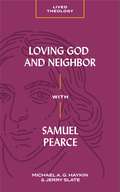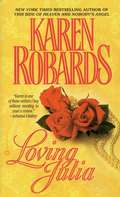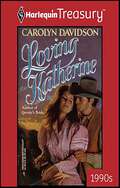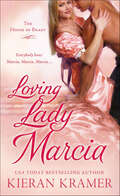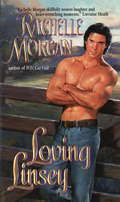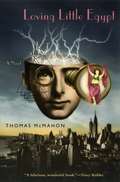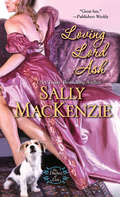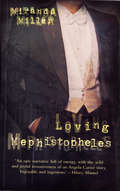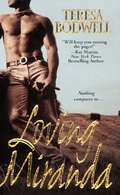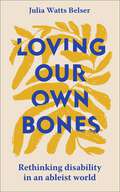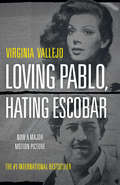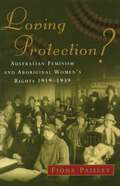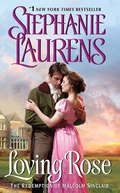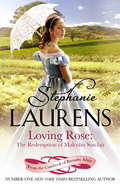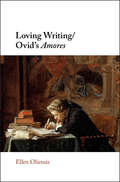- Table View
- List View
Loving Frank: A Novel (Playaway Adult Fiction Ser.)
by Nancy HoranI have been standing on the side of life, watching it float by. I want to swim in the river. I want to feel the current. So writes Mamah Borthwick Cheney in her diary as she struggles to justify her clandestine love affair with Frank Lloyd Wright. Four years earlier, in 1903, Mamah and her husband, Edwin, had commissioned the renowned architect to design a new home for them. During the construction of the house, a powerful attraction developed between Mamah and Frank, and in time the lovers, each married with children, embarked on a course that would shock Chicago society and forever change their lives. In this ambitious debut novel, fact and fiction blend together brilliantly. While scholars have largely relegated Mamah to a footnote in the life of America's greatest architect, author Nancy Horan gives full weight to their dramatic love story and illuminates Cheney's profound influence on Wright. Drawing on years of research, Horan weaves little-known facts into a compelling narrative, vividly portraying the conflicts and struggles of a woman forced to choose between the roles of mother, wife, lover, and intellectual. Horan's Mamah is a woman seeking to find her own place, her own creative calling in the world. Mamah's is an unforgettable journey marked by choices that reshape her notions of love and responsibility, leading inexorably ultimately lead to this novel's stunning conclusion. Elegantly written and remarkably rich in detail, Loving Frank is a fitting tribute to a courageous woman, a national icon, and their timeless love story. BONUS: This edition includes an excerpt from Nancy Horan's Under the Wide and Starry Sky.
Loving God and Neighbor with Samuel Pearce (Lived Theology)
by Michael A. G. Haykin Jerry SlateThe love of God and neighbor is the heart of the Christian faith. Forgotten saint Samuel Pearce teaches us how to live a life faithful to the greatest commandment. Pearce was a Baptist pastor known in eighteenth-century England for his moving preaching and strong, pious character. In his short life, he supported believers in his own parish as well as in the many cities where he preached and helped send missionaries. Yet his personal faith, founded on the "holy love" of God, formed his most compelling witness to the world. By getting to know Pearce's story, readers will learn from his example what it looks like to love God and neighborâ€"in good times as well as challenging and seemingly mundane ones. The Lived Theology series explores aspects of Christian doctrine through the eyes of the men and women who practiced it. Interweaving the contributions of notable individuals alongside their overshadowed contemporaries, we gain a much deeper understanding and appreciation of their work and the broad tapestry of Christian history. These books illuminate the vital contributions made by these figures throughout the history of the church.
Loving Her Amish Neighbor
by Rebecca KertzThey’ve both been hurt before… She’ll take his help,but not his heart.After her buggy’s damaged in an accident, pregnant widow Lucy Schwartz is reluctant to accept help from Gabriel Fisher. He tugs at her heart, and falling in love again is risky. But as her neighbor insists on pitching in while her buggy’s out of commission, keeping her distance from him could prove impossible. Because this wounded Amish bachelor might be just what she and her daughter need…From Love Inspired: Uplifting stories of faith, forgiveness and hope.
Loving Isaac and A Groom for Greta
by Anna Schmidt Rebecca KertzExperience love and healing in these Amish tales Loving Isaac by Rebecca Kertz Back in his Amish community, Isaac Lapp works to rebuild his tattered reputation. His one saving grace is childhood pal Ellen Mast. But even though Ellen's kindness and beauty are helping him become more confident each day, the lure of the non-Amish world beckons. Isaac must make a choice: a life beyond Happiness, Pennsylvania...or the woman who might just become his forever home. A Groom for Greta by Anna Schmidt When Greta Goodloe's longtime sweetheart ends their engagement, she decides to take comfort in matchmaking her quiet schoolmarm sister with handsome newcomer Luke Starns. Yet the more she tries to throw them together, the more Luke fascinates her. And Luke can't help but be charmed by Greta's warm smile. Does he dare to stray from the sensible choice and take a chance on happiness?
Loving Julia
by Karen Robards"You'll have to learn to speak, to dress, to conduct yourself as a lady." Those orders were intoned by Sebastian, the cold haughty Earl of Moorland to Jewel Combs, the cockney commoner defiantly facing him in his luxurious drawing room. Despite his icy demeanor, Jewel couldn't help but notice that the Earl was a breathtakingly handsome man. Still, the only thing that checked her saucy reply was the realization that the Earl's outlandish plans would give her a home, and she would never be hungry, shivering, or frightened in dark dockside alleys ever again. Fate had brought Jewel to the mansion on Grosvenor Square; now she was going to grab the gold ring of chance and become "Julia Stratham," a genuine upper-crust, silk-and-lace aristocrat. She didn't know why blue-blooded Sebastian had accepted the challenge to transform her from a diamond in the rough into a glittering gem. She did know she had a surprise in store of her own: She would teach this titled nobleman that although she wasn't a lady, she was all woman... and the one with whom he was going to madly, unwisely, and passionately fall in love.
Loving Katherine
by Carolyn DavidsonRoan Devereaux Could Gentle Any Filly With A Look And A Touch-but Kate Cassidy presented a real challenge. With her coltish grace and mile-wide stubborn streak, she was more woman than most men could handle-and exactly what he needed.Men were impulsive critters, Katherine Cassidy swore, and Roan Devereaux had only proved that when he'd up and asked Kate to marry him! It was a crazy idea-but no crazier than the sound of her heart singing "yes" in reply...!
Loving Lady Marcia: The House Of Brady (House of Brady #1)
by Kieran KramerLOVING LADY MARCIAKieran KramerIn the House of Brady, three very lovely girls have hair of gold—and hearts to match—but finding a match among the gentlemen of London is one comedy of errors that could bring down the house…MARCIA GETS SCHOOLED…Of the three Brady sisters, Lady Marcia has always seemed the girl most likely to lead a perfectly charmed life. But after a handsome cad breaks her heart, she swears off love and devotes her life to teaching girls at a private school. In spite of her family's wish for a London debut, Marcia is happy where she is—until terrible news sends her back to the Brady clan…and into the arms of an unexpected suitor.ON THE SUBJECT OF LOVEA dark and dashing earl who knows Marcia's past, Duncan Lattimore is surprised by what a fascinating and independent woman she's become. Marcia, too, is surprised—by the fiery attraction she feels for Duncan. But why—why—must he be the brother of the scoundrel who broke her heart? Why must Marcia's rival at school forbid her from seeing him? How can this lady possibly resist this fellow—when they know that it's much more than a hunch…?"A delicious romp that will keep you laughing."—Sabrina Jeffries (on Kieran Kramer's Impossible Bachelor series)
Loving Lies (Dangerous Desires #1)
by Tina DonahueDeception knows no limits. Passion knows no bounds.When she is kidnapped, Senorita Isabella knows the men have been sent by her uncle in a murderous attempt to control her family’s fortune. But when she is rescued by a dashing and mysterious warrior, Isabella can’t imagine why a stranger would risk his life for her—until she discovers her rescuer believes she’s someone else…Fernando de Zayas loves nothing more than the cry of battle. Defying death is his way of life. But when he discovers his betrothed has been kidnapped, he rushes to her aid—never suspecting that spirited beauty would soothe his warrior heart…With her uncle’s minions close on their heels, Isabella finds herself drawing closer to Fernando. But as the desire between them builds, her secret could keep them apart forever…
Loving Linsey
by Rachelle MorganThe signs have mistakenly told superstitious Linsey Gordon that she has less than three months to live, and she's determined to do one last good deed before she dies. But matchmaking for her timid sister Addie is going to take doing, when the man Linsey has in mind for Addie ends up falling for her! She'll have to stop trusting in signs, and believe in something much stronger than luck: passionate, unpredictable love.
Loving Little Egypt: A Novel (Phoenix Fiction Ser.)
by Thomas McMahonIn the early 1920s, nearly blind physics prodigy Mourly Vold finds out how to tap into the nation's long distance telephone lines. With the help of Alexander Graham Bell, Vold tries to warn the phone companies that would-be saboteurs could do the same thing, but they ignore him. Unfortunately, his taps do catch the notice of William Randolph Hearst, who hires Thomas Edison to get to the bottom of them—and the chase is on!
Loving Lord Ash (Duchess of Love #3)
by Sally MacKenzieShocking misunderstandings complicate a marriage in this Regency romance by the USA Today–bestselling author of Surprising Lord Jack.Kit, the Marquis of Ashton, is in a sticky wicket. He married young and for love—how naïve. He discovered his mistake the very day of his wedding but is now saddled with a wife he&’s reluctant to trust. And however much evidence he gathers against faithless Jess, he can&’t seem to prove her guilt to the final judge—his foolish heart.Jessica knows she&’s bobbled her marriage, however innocently. A fairytale wedding makes no difference if she hasn&’t got the marquis charmed to show for it. Well, she&’s had enough of accidental encounters with naked gentlemen and near misses explaining things to her husband. It&’s time to buck up and go win her man back—even if she has to fight very dirty indeed.&“MacKenzie entices her readers into a funny, romantic tale with her protagonists at cross purposes, sizzling sensuality, a touch of poignancy and a surprise twist. This all adds up to a delightful read.&” —RT Book Reviews&“Readers will love being treated to this lively, hilarious Regency romp in MacKenzie&’s Duchess of Love series and will want all three books.&” —Booklist (starred review)
Loving Mephistopheles
by Miranda MillerJenny is a third-rate music-hall chanteuse living in Edwardian London. When she remarks to her mentor and lover Leo that she never wants to grow old, she is unwittingly making a pact with the Devil. Her contract to love him will reside at the Metaphysical Bank in High Street Kensington--forever. Leo has lived through thousands of years in numerous incarnations. As he gleefully exploits what 20th century London has to offer--as a magician ("the Great Pantoffsky"), fighter pilot, coke dealer, city banker--Jenny finds that the joy of eternal youth is short-lived. Her unchanging appearance provokes questions and Jenny has to move abroad or constantly reinvent herself. For 60 years she has to pass herself off as her own offspring. When she bears a real daughter that may or may not be Leo's, his destructive nature comes to the fore. She flees from him and destroys the contract that she has never read. At the same time Leo understands that Jenny is the one woman that he has truly loved and that perhaps it is time the Devil made a stab at family life, whatever the consequences. A compelling journey through 20th-century Europe and beyond, Miranda Miller's ingenious take on the Faust story is by turns humorous, erotic, and terrifying.
Loving Miranda
by Teresa BodwellEvery Heart Needs A Home Miranda Chase can't refuse when her pregnant sister Mercy asks her to return to their Colorado ranch, even though her sister's new family is a painful reminder of everything Miranda knows she'll never have. She'll travel to the ends of the earth to protect Mercy's newfound happiness--even if it means sweet-talking Benjamin Lansing, whose claim to Mercy's ranch reaches beyond money. But despite Miranda's distrust of the man, the sweet words come easily, as do the kisses. . . Ben isn't looking for love--and certainly not with Miranda, who is as pure and innocent as a spring flower. She has no need of a hardened man like him. All he wants is to collect what's owed him and be on his way. But Miranda's soft touch is temptation indeed, and loving her--for now and forever--just might be what he's truly wanted all along. . .
Loving Mr. Darcy
by Sharon LathanIn this sweet and romantic Pride and Prejudice sequel, Darcy and Lizzy venture away from Pemberley to journey through England, finding friends, relatives, fun, love, and an even deeper and more sacred bond along the way. Be additionally bewitched. . . . body and soul. . .
Loving Our Own Bones: Rethinking disability in an ableist world
by Julia Watts BelserOpen the Bible, and disability is everywhere. Moses stutters and thinks himself unable to answer God's call. Isaac's blindness lets his wife trick him into bestowing his blessing on his younger son. Jesus heals the sick the blind, the paralyzed, and the possessed. For centuries, these stories have been told and retold by commentators who treat disability as misfortune, as a metaphor for spiritual incapacity, or as a challenge to be overcome.Loving Our Own Bones turns that perspective on its head. Drawing insights from the hard-won wisdom of disabled folks who've forged difference into fierce and luminous cultural dissent, Belser offers fresh and unexpected readings of familiar biblical stories, showing how disability wisdom can guide us all toward a powerful reckoning with the complexities of the flesh. She talks back to biblical commentators who traffic in disability stigma and shame, challenging interpretations that demean disabled people and diminish the vitality of disabled lives. And she shows how Sabbath rest can be a powerful counter to the relentless demand for productivity, an act of spiritual resistance in a culture that makes work the signal measure of our worth.With both a lyrical love of tradition and incisive political analysis, Belser braids spiritual perspectives together with keen activist insights-inviting readers to claim the power and promise of spiritual dissent, to nourish their own souls through the revolutionary art of radical self-love.
Loving Pablo, Hating Escobar
by Virginia VallejoNow a major motion picture! Pablo Escobar was one of the most terrifying criminal minds of the last century. In the decade before his death in 1993, he reigned as the head of a multinational cocaine industry and brought the Colombian state to its knees, killing thousands of politicians, media personalities, police, and unarmed citizens.In the 1980s, Virginia Vallejo was Colombia’s most famous television celebrity: a top-rated anchorwoman and a twice-divorced socialite who had been courted by the country’s four wealthiest men. In 1982, she interviewed Pablo Escobar on her news program, and soon after, they began a discreet—albeit stormy—romantic relationship. During their five-year affair, Escobar would show Vallejo the vulnerability of presidents, senators, and military leaders seeking to profit from the drug trade. From Vallejo’s privileged perspective and her ability to navigate the global corridors of wealth and high society, Escobar gained the insight to master his manipulation ofColombia’s powerful elite and media.Loving Pablo, Hating Escobar chronicles the birth of Colombia’s drug cartels: the kidnappers, the guerilla groups, and the paramilitary organizations. It is, above everything, a great love story—a deep and painful journeythrough a forbidden relationship—that gives us an intimate vision of thelegendary drug baron who left his mark on Colombia, Latin America, the United States, and the world forever.
Loving Pablo, Hating Escobar
by Virginia VallejoA revealing memoir of Colombian television journalist Virginia Vallejo's affair with the "King of Cocaine," notorious Medellín drug lord, Pablo Escobar. Soon to be a major motion picture starring Javier Bardem and Penelope Cruz. At 33, Virginia Vallejo was media elite. A renowned anchorwoman and socialite, and a model who appeared on magazine covers worldwide, Vallejo was the darling of Colombia's most powerful politicians and billionaires. Meeting Pablo Escobar in 1983, and becoming his mistress for many years, she witnessed the rise of a drug empire that was characterized by Escobar's far-reaching political corruption, his extraordinary wealth, and a network of violent crime that lasted until his death in 1993. In this highly personal and insightful story, Vallejo characterizes the duality of Escobar's charm and charisma as a benefactor to the people of Colombia, and the repulsion of his criminal actions as a tyrannical terrorist and enemy of many world leaders. Told from the present day perspective, and reflecting on her cooperation with the US Department of Justice, in 2006, as she testified against high-ranking Colombian ministers on trial for conspiracy and murder, Vallejo offers a compelling work of intimate reflection and critical journalism--a unique perspective on the Colombian drug wars and the endlessly fascinating figure, Pablo Escobar.
Loving Protection?: Australian Feminism and Aboriginal Women's Rights 1919–1939
by Fiona PaisleyIn the 1920s and 1930s, there was a highly visible network of white women activists who vigorously promoted the rights of Australian Aboriginals. In this little-known campaign—by middle-class women's organisations such as the Australian Federation of Women Voters—Anglo-Australian women, among them Bessie Rischbieth, Edith Jones, Constance Cooke and Mary Bennett, took to the world stage to expose the plight of Aboriginal women. Their campaign made headline news, and Australian state and federal governments were shamed into action. One important outcome was the 1934 Royal Commission into Aboriginal Status and Conditions in Western Australia, at which white women activists presented compelling evidence of the need for reform in Aboriginal policy. These women strongly opposed assimilationist policies of the time such as child removal, institutionalisation and dispersal, promoting in their place assimilation based on universal and specific rights. Loving Protection? breaks new ground, highlighting white women's challenges to federal Aboriginal policy, and their attempt to complement men in the running of modern Australia.
Loving Rose
by Stephanie Laurens#1 New York Times bestselling author returns with another thrilling story from the Casebook of Barnaby Adair . . .Miraculously spared from death, Malcolm Sinclair erases the notorious man he once was. Reinventing himself as Thomas Glendower, he strives to make amends for his past, yet he never imagines penance might come via a secretive lady he discovers living in his secluded manor.Rose has a plausible explanation for why she and her children are residing in Thomas's house, but she quickly realizes he's far too intelligent to fool. Revealing the truth is impossibly dangerous, yet day by day he wins her trust, and then her heart.But then her enemy closes in, and Rose turns to Thomas as the only man who can protect her and the children. And when she asks for his help, Thomas finally understands his true purpose, and with unwavering commitment, he seeks his redemption the only way he can--through living the reality of loving Rose.
Loving Rose: Number 3 in series (From the Casebook of Barnaby Adair #3)
by Stephanie LaurensNew York Times bestselling author Stephanie Laurens returns with another thrilling story from the Casebook of Barnaby Adair . . . Miraculously spared from death, Malcolm Sinclair erases the notorious man he once was. Reinventing himself as Thomas Glendower, he strives to make amends for his past, yet he never imagines penance might come via a secretive lady he discovers living in his secluded manor.Rose has a plausible explanation for why she and her children are residing in Thomas's house, but she quickly realizes he's far too intelligent to fool. Revealing the truth is impossibly dangerous, yet day by day, he wins her trust, and then her heart.But then her enemy closes in, and Rose turns to Thomas as the only man who can protect her and the children. And when she asks for his help, Thomas finally understands his true purpose, and with unwavering commitment, he seeks his redemption in the only way he can - through living the reality of loving Rose.
Loving Will Shakespeare
by Carolyn MeyerIn Stratford-upon-Avon in the sixteenth century, Anne Hathaway suffers her stepmother's cruelty and yearns for love and escape, finally finding it in the arms of a boy she has grown up with, William Shakespeare.
Loving Writing/Ovid's Amores
by Ellen OliensisThis book offers a fresh reading of the Amores centered on the aggressive, opportunistic, endlessly fluent, pleasure-seeking character, the poet-lover of the collection, here called Naso. Resisting the scholarly tendency to segregate the poet from the lover, Ellen Oliensis teases out the compromising affiliations between Naso's most 'poetic' performances and his seamy erotic adventures and shows that his need to write the script of his own subjection, far from delegitimizing his desire, tallies with other features of his generally masochistic profile. The book concludes with an exploration of the masochistic pleasures of the elegiac writing project as such, thereby effectively re-uniting Ovid with his surrogate within the collection.
Loving You Always
by Peggy GaddisAs Crimson Romance celebrates its first anniversary, we honor those pioneers who helped shape the direction of romance novels for all of us. Suspense, mystery, paranormal activity and love - always love - have been the cornerstone of the genre since the early 1970s. Now we have updated the covers to these classics - but not the words - and reissued these timeless reads to let you relive the thrill of discovering a world of romance all over again.Loving you always was the way they'd thought it would be. But ten days after they were married Tip was sent overseas, and soon tragedy struck - he was reported dead in action. Now Gerry Parker, his beautiful young widow, is through with mourning; she is ready to begin life with a new man. Then comes the blow that rips her from the arms of the man she had grown to love: Tip is alive and returning to retrieve the past with the girl he'd married - a girl who no longer loves him!Sensuality Level: Behind Closed Doors
Loving You Always
by Peggy GaddisAs Crimson Romance celebrates its first anniversary, we honor those pioneers who helped shape the direction of romance novels for all of us. Suspense, mystery, paranormal activity and love - always love - have been the cornerstone of the genre since the early 1970s. Now we have updated the covers to these classics - but not the words - and reissued these timeless reads to let you relive the thrill of discovering a world of romance all over again.Loving you always was the way they'd thought it would be. But ten days after they were married Tip was sent overseas, and soon tragedy struck - he was reported dead in action. Now Gerry Parker, his beautiful young widow, is through with mourning; she is ready to begin life with a new man. Then comes the blow that rips her from the arms of the man she had grown to love: Tip is alive and returning to retrieve the past with the girl he'd married - a girl who no longer loves him!Sensuality Level: Behind Closed Doors
Loving You Always
by Peggy GaddisAs Crimson Romance celebrates its first anniversary, we honor those pioneers who helped shape the direction of romance novels for all of us. Suspense, mystery, paranormal activity and love - always love - have been the cornerstone of the genre since the early 1970s. Now we have updated the covers to these classics - but not the words - and reissued these timeless reads to let you relive the thrill of discovering a world of romance all over again.Loving you always was the way they'd thought it would be. But ten days after they were married Tip was sent overseas, and soon tragedy struck - he was reported dead in action. Now Gerry Parker, his beautiful young widow, is through with mourning; she is ready to begin life with a new man. Then comes the blow that rips her from the arms of the man she had grown to love: Tip is alive and returning to retrieve the past with the girl he'd married - a girl who no longer loves him!Sensuality Level: Behind Closed Doors

